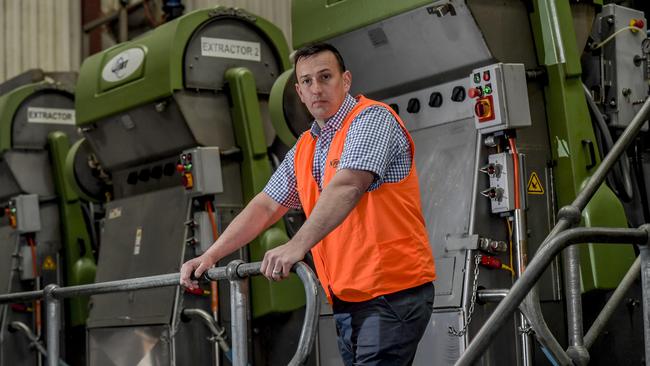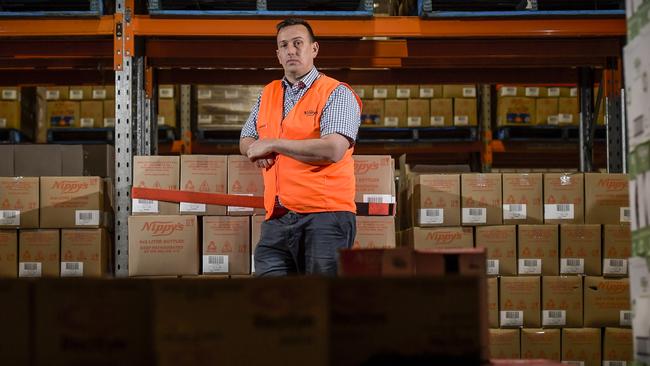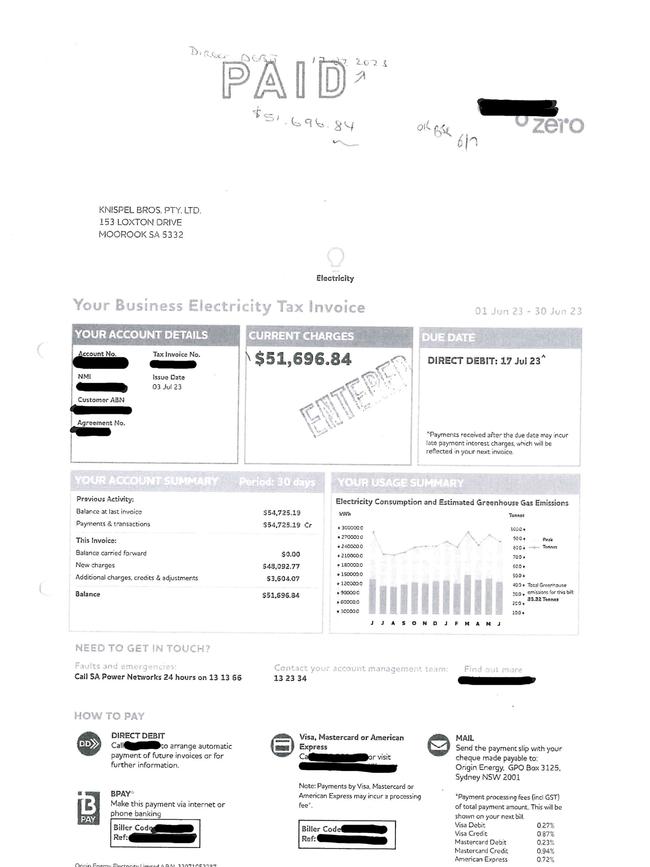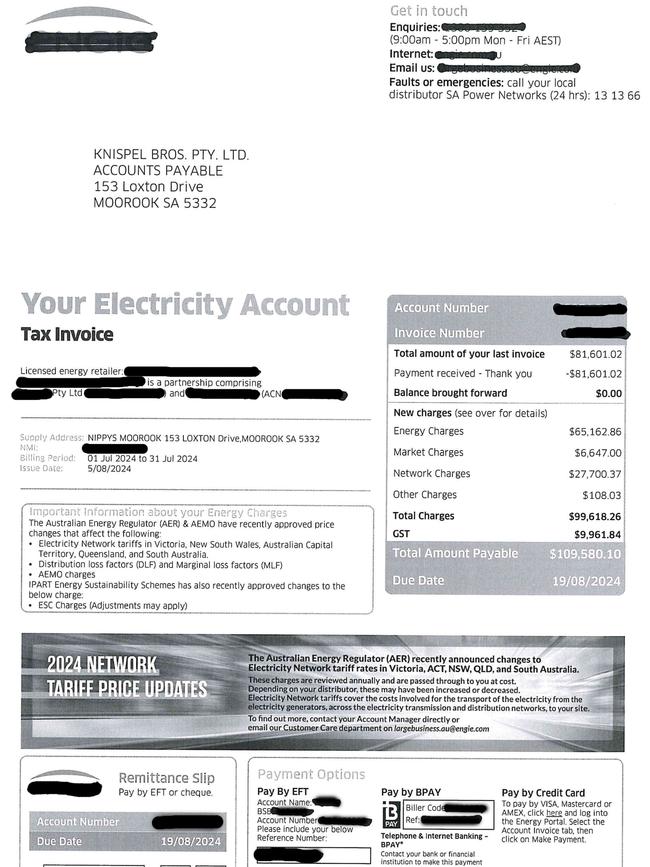Leading regional businesses crippled by country’s highest electricity costs
SA’s iconic juice manufacturer is one of many major regional businesses being smashed by the surging cost of electricity – despite cutting the amount of power it consumes.
SA News
Don't miss out on the headlines from SA News. Followed categories will be added to My News.
Leading regional South Australian businesses have been hit with surging power bills as the country’s highest electricity costs cripple the agriculture industry and send staple produce prices soaring.
In a striking example of an unfolding crisis, iconic firm Nippy’s monthly electricity bill more than doubled in a year despite the drinks manufacturer using fewer power hours.
Other industries have been slugged with bill increases, adding tens of thousands of dollars to overhead costs.
Despite expensive investment in renewable equipment and seasonal producers being in “off seasons”, country owners told how “network charges” still sparked large bills.
Concerned farmers have also been forced to employ special “energy consultants” to help save money.

As a new political row erupted, business chiefs revealed energy costs were among the top concerns for firms desperate to avoid hurting customers in a cost-of-living crisis.
Ben Knispel, joint managing director of the Knispel Group, the company behind the Nippy’s brand, said the increasing rate of electricity was a major concern.
The firm, which has two Riverland factories at Waikerie and Moorook along with a Regency Park warehouse in Adelaide’s northwest, had a “great” multi-year contract end in December 2023.
The company, founded almost 100 years ago and famed for its citrus juices and flavoured milk, was invoiced $51,600 last June for 260,073kw/h of use at its Moorook plant.
This month, its invoice was $109,580.10 – including almost $34,350 of market or network charges – despite using almost 6200 fewer hours.
After spending almost $1m on solar panels – which will cost significant money to repair – energy efficient lighting and special pump equipment, its annual power “spot price” bill is almost $2m.
“It just would be nice if we had reliable power 24 hours a day and grid stability because it’s a mess,” said Mr Knispel, company boss for 10 years who employs more than 200 workers.
“It’s just so frustrating doing the right thing, trying to reduce our footprint.

“But it’s all over the place. We’re growing and we’re doing OK but we will look to have price rises, sadly, as we can’t absorb these costs forever.”


Dairy Farmers Association president, former Upper House MP Robert Brokenshire, said his industry had suffered an “astronomical” rise in electricity costs that were 38 per cent on average.
His bill had increased from $70,000 last year to almost $100,000 in 2024 for his nearly 400ha Fleurieu Peninsula property that farms 800 cows.
He has been forced to hire a consultant to help deal with he said was a top 5 cost.
“These prices are so out of control, and complex, that you need an external consultant to organise the power,” said Mr Brokenshire, a farmer for 40 years.
Century Orchards chief executive officer Brendan Sidu, said his Loxton almond business had power bills surge up to 60 per cent in the past three years.
Mr Sidu, an Australian Almond Board member, said his annual electricity bill was almost $100,000 compared to $60,000 two years ago but his the industry can’t onpass costs.
“We just have to absorb it all and it’s definitely hurting,” he said.
Master Builders Association of SA chief executive officer Will Frogley said: “Massive power prices are killing our regions. They’re not just affecting consumers, they’re stifling developments and job growth.”
High energy prices were among the top three issues of the SA Business Chamber’s Regional Voice survey, published on August 11 and were of particular concern in agriculture, retail and accommodation sectors.
The report published data showing SA had experienced the greatest increase in electricity bills in Australia.
“Businesses in South Australia continue to have the highest annual electricity
bills ($10,427), almost double that of their counterparts in Tasmania ($5,902),” the SA Business Chamber report said.
The federal Liberal Member for Barker, Tony Pasin, whose electorate covers the Barossa Valley, Riverland, Coorong, and South East, condemned Labor’s “renewable only policy” that left SA with the “highest electricity costs in the country”.
“You can’t have a future made in Australia if present day electricity prices mean long standing successful business like Nippy's are finding it increasingly hard to keep the lights on,” he said.
State Energy Minister Tom Koutsantonis said authorities were “acutely aware of cost of living pressures, including energy bills, on families and businesses”.
“We were pleased to see bigger-than-expected cuts to electricity bills locked in from July for South Australian households and small businesses,” he said.
He “strongly” recommended businesses concerned about energy bills to contact the government’s free Energy Advisory Service.
Climate Change and Energy Minister Chris Bowen’s spokeswoman said the federal government was delivering $325 in energy bill relief to one million small businesses and $300 per household.
Market offer prices had fallen, partly because of Labor’s coal and gas price caps.
“SA households on standard offers are seeing falls in energy bills of over 15 per cent, and small businesses are seeing falls of over 14 per cent compared to last year,” she said.
“Tony Pasin and the Liberals voted against energy bill relief and coal and gas caps. They now want to introduce the most expensive form of energy, nuclear energy.”
Nuclear energy would add $1000 to energy bills and supply less than four per cent of energy required by households and businesses, she said.
More Coverage
Read related topics:SA Bush Summit





